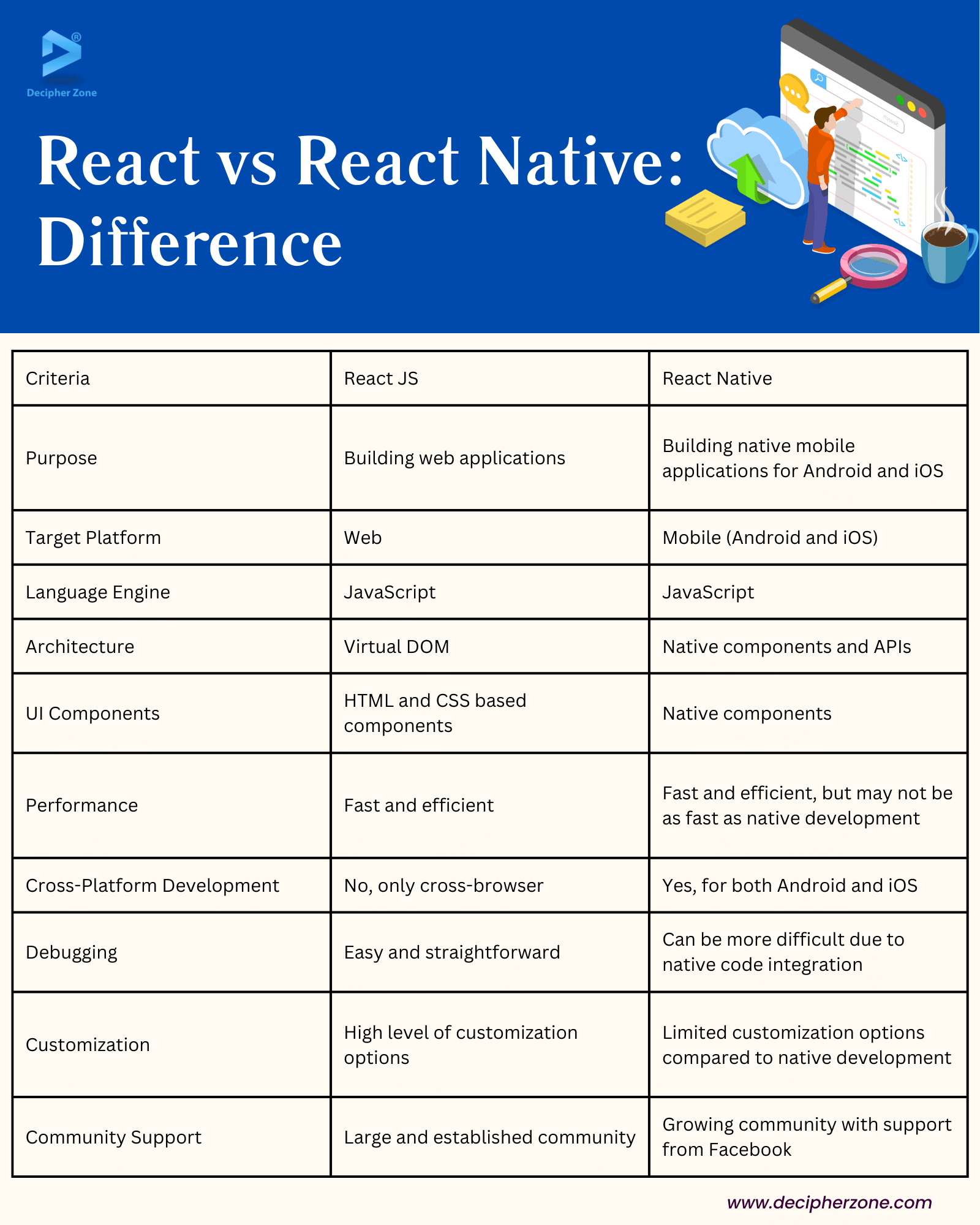React vs React Native? Confused when to choose which? Are they similar, related or different? Let us give all the answers in this detailed blog including pros and cons, differences, and how they work which will help you choose the ideal one for your project even if you are a beginner.
React vs React Native, you might have come across this phrase. If not, do you think these technologies are similar? If you are also confused like others, you are at the right place to unravel the mystery behind them.
As a neophyte, React vs React Native looks similar by their names, as they both have ‘react” as a part of their name. Expert developers are familiar with these tools and mainly use them to develop web and mobile apps.
If you’re interested in knowing the pros and cons of React and React Native as well as how they work. Look no further, as this blog covers all the aspects of React vs React Native. So, let’s delve into the details and gain a thorough understanding.
Read: Angular vs React
React vs React Native: Introduction
React and React Native were developed by Facebook and have rapidly accumulated an enormous fan base. React is the JavaScript library used to create single-page web apps, often known as React JS. Whereas, React Native is a framework for designing mobile applications that is built on React js. Furthermore, React Native allows you to create native mobile apps using reusable components.
Now let’s explore these programming technologies thoroughly.
What is React?
React or React js is an open-source framework to develop user interfaces for web apps. Developers of React js can easily integrate plugins and libraries with existing codes using virtual DOM.
It also enables developers to develop quick, scalable, and unembellished web apps. Moreover, virtual DOM in React js is a lightweight representation of the actual DOM that is used to calculate the changes that are made in the user interface.
What is React Native?
React Native helps build solutions for a broad range of projects and issues in the mobile app development space. Components, state management, and the virtual DOM are just a few of the React features that React Native leverages while developing native mobile apps.
With the React js framework and a single codebase, developers can now create mobile apps that have the same functionality as conventional native apps, but with extra advantages. Generally, React Native utilizes the base abstraction of React where the core is similar but only the libraries are different.
React vs React Native: How do they Work?
React and React Native employ the Virtual DOM and APIs respectively to render UI components that are compatible with different operating systems. React Native is utilized to build cross-platform mobile applications using expertise in web development tools like HTML, CSS, JavaScript, and the React core library.
Read: Server-Side Rendering with React
This brings us to the same question, so let’s go further.
React
React JS is convenient for web development projects that require dynamic and engaging user interfaces. The capacity of libraries and frameworks to handle the DOM has a crucial impact on how UI components are used and displayed.
Single-page applications (SPAs), Complex web interfaces, Large-scale web applications, and Responsive web design are some common use cases for React js.
Document Object Model (DOM) is a vital programming interface that represents the web document and its content. Virtual DOM is a virtual representation that manages quick updates while creating dynamic user interfaces. Moreover, it is fast and has enhanced performance and a finer user experience than real DOM updates.
React Native
Besides that, React Native develops IOS components in Objective-C and leverages Java APIs to render Android UI components. JavaScript is then used to create the remaining code and customize the application for every platform, allowing for the highest level of code shareability and component reusability.
React JS makes use of CSS and HTML, whereas React Native does not. For this reason, in order to style the React Native components, you must develop style sheets in JavaScript. Though it may have a similar appearance to CSS, they are not the same.
React vs React Native: Difference
Some aspects of React and React Native are different such as,
-
Installation Process
React- it incorporates the React library into the HTML page to easily build web app UI.
React Native- it requires a development environment like Android Studio and Xcode for cross-platform app development.
-
Efficiency
React- it executes apps on the client’s side while generating code on the server’s side.
React Native- it can incorporate codes with Java, Swift, and Objective-C.
-
Technology Base
React- must learn and understand JavaScript.
React Native- it combines Java, Objective-C, Objective-C++, and C++ code.
-
Feasibility
React- it combines HTML and JavaScript technologies with React js.
React Native- adds various native components to any existing hybrid app.
-
Compatibility
React- it boosts SEO for web apps.
React Native- it builds interactive and engaging user interfaces.
-
Syntax
React- it renders HTML components such as <p>, <div>
React Native- it renders native components such as <view>, <text>, and <images>.
-
Components
React- it has a component-based library.
React Native- it has native components and native modules.
-
Navigation
React- it offers a react-router library for navigation.
React Native- it offers a unique library navigator to manage transitions between different displays.
-
Storage
React- it uses local storage to store and manage data.
React Native- it uses AsyncStorage by default.
-
Search-Engine Friendly
React- it has various tools and libraries to optimize the apps in terms of SEO during development.
React Native- It has nothing to do with SEO.
Read: How to Hire a Dedicated Team of React Developers

React vs React Native: Pros and cons
Below are the benefits and drawbacks of React vs React Native,
React
|
Pros |
Cons |
|
|
React Native
|
Pros |
Cons |
|
|
React vs React Native: When to choose which?
React is suitable for building complex web apps, whereas React Native is suitable for building simple mobile apps. While building a cross-platform app, React is suitable but with limitations as adapting the design for mobile apps requires extra work, however, React Native has more potential and is more compatible. Moreover, developing an application with a need for access to native features will only be suitable for React Native through native modules.
React Native for Web is a technique that allows compiling codebase to both React and React Native. The React native components and APIs are not available on React js, for this, you need to use third-party libraries. Hence, the answer to the question, explains that depending on the codebases and required functionality, React and React Native are used.
Bottom Line!
To summarize, React and React Native are both excellent choices for developing applications. React is more suitable for web applications because of its numerous features, faster development speed, and cross-browser compatibility. On the other hand, React Native provides access to native APIs and is cross-platform compatible with IOS and Android, making it the best option for mobile applications.
Read: Native vs Cross-Platform App Development
Regardless of the platform you choose, what is essential is to have expert developers. At Decipher Zone, you can hire developers with years of experience to help you turn your vision into action.
FAQs
-
What is React js?
React js is an open-source framework to develop user interfaces for web apps. It also enables developers to develop quick, scalable, and unembellished web apps.
-
Which is better, React or React Native?
React and React Native, both are compatible depending on the requirements of the business. React is most suitable for web applications whereas React Native is for mobile applications.
-
What is the difference between React Native and React?
React and React Native are different based on the Installation Process, Compatibility, Syntax, Components, and Navigation.
-
What is React Native used for?
React Native develops IOS components in Objective-C and leverages Java APIs to render Android UI components.
-
Is React Native just for mobile?
React Native helps build solutions for a broad range of projects and issues in the mobile app development space.

